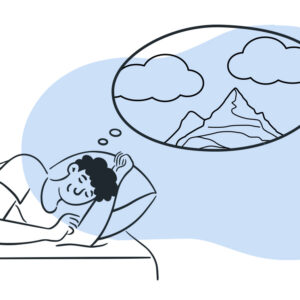Sleep Diary
Disclosure: By clicking on the product links in this article, Mattress Nerd may receive a commission fee at no cost to you, the reader. Read full disclosure statement.
A sleep diary is a way to keep track of how you’re sleeping over time. This might give you insights that can help improve your sleep quality. Here’s how to make one and how it works.
What is a Sleep Diary?
A sleep diary is a journal you can keep on paper or electronically that allows you to track your daily habits and how you sleep each night. It’s most effective if you complete it daily for at least two consecutive weeks.
It also helps identify your sleep patterns. For example, what time do you fall asleep? How does it correlate with your other daily activities, such as exercising?
If you experience sleep disruptions, you’ll also record them in the diary. For example, did you wake up in the middle of the night to go to the bathroom?
You can give all of that information to your doctor. Then, you both can review your sleep patterns and identify factors that might lead to sleep problems.
Benefits of a Sleep Diary
Your daily routine may directly impact your sleep habits. Things like the:
Even a slight adjustment in any of the above can make a difference in your night’s rest. A sleep diary is a fast and effective way to compare your day with how you sleep.
Another benefit of a sleep diary is it allows reliable data collection. For example, many people may need to learn how much sleep they get on an average night. But they can only speculate unless they keep a daily record. Keeping a sleep diary clears up assumptions and provides concrete evidence of each day.
How to Keep a Sleep Diary
The key to keeping a sleep diary is writing in your diary every day. It’s all about consistency to look for patterns in your sleep. If you miss a day, that’s okay. But try to fill in anything you remember.
Sleep diaries document more than your sleep, too. You’ll also note the activities of the day. So, you’ll keep track of the following:
- What time did you wake up?
- How many total hours did you sleep?
- Do you feel rested or tired?
- Did you nap during the day, and when?
- Did you consume any alcohol, caffeine, or nicotine? When and how much?
- Did you exercise today? When and how long?
- Did you take any medications? When? What time? What did you take?
- What time did you eat? What did you eat?
Then, you focus on the events of the night. That includes:
- What time did you go to bed?
- How long did it take for you to fall asleep?
- How many times did you wake up during the night?
- What caused you to wake up during the night?
You may find many different sleep journal templates online. There are also highly rated smartphone apps like SleepScore that you may also prefer instead of writing. These apps also offer extra help, such as virtual sleep coaches and sleep sounds, to help you fall asleep.
How to Use Your Sleep Diary
You’ll use your sleep diary to look for patterns in your sleep compared to your daily routine. For example, if you have a night where you woke up more than usual, you’d look and see what you ate and what time you ate. If you ate later than expected, it’s a sign to avoid eating late next time.
A sleep diary may help if you experience insomnia. Insomnia is a common sleep disorder that causes one to:
- have trouble falling asleep
- have trouble staying asleep
- have difficulty getting good quality sleep
One or all of these may indicate insomnia which might also require medical treatment. In addition, insomnia can negatively impact your way of life and lead to tiredness during the day.
Before diagnosing a sleep disorder like this one, your doctor will want to see your sleep habits and might suggest keeping a sleep diary. They may also recommend the following:
- regular sleep schedule
- cognitive behavioral therapy
- medication
- supplements
Insomnia and other sleep disorders carry risks of chronic conditions like high blood pressure, diabetes, and mood disorders. Keeping a sleep diary is a significant first step in taking control of your health and getting to the bottom of why you’re not getting the quality sleep you need.
Other Tips for Tracking Your Sleep
Here are some other tips on how you can better track your sleep.
Use your smartphone
There are sleep apps and even wearable sleep-tracking devices available that can connect to your phone. For example, a smartwatch or fitness tracker may have the ability to monitor your sleep patterns.
You may also purchase a smart mattress designed to improve sleep quality. These specialty mattresses use sensors to track your sleep. Some can also connect to other devices to help improve your sleep hygiene.
Consider a print journal
Our smartphones expose us to blue light. Thus, it can inhibit melatonin production. That might make falling asleep challenging.
If you’re already getting too much screen time, consider a physical journal or printed template to record your sleep diary entries. This switch may help you avoid being on your phone as much at night.
If you feel you’re looking at screens for a good portion of the day, purchasing a print journal or notebook may be better for your sleep diary entries.
Keep your diary up to date
Making your sleep diary a priority is a great way to stay on track. It’s a good idea to make a small entry in the morning and at night. That way, the information is fresh in your mind. It may also be more accurate than recollecting the events of your day and night.
Takeaway
A sleep diary is an effective way to track your sleep patterns. For example, suppose you’re experiencing poor sleep quality or excessive tiredness during the day. In that case, a sleep diary is a great way to get to the bottom of it.
Reviewing the events of your day tells your doctor quite a bit about your sleep routine and if you’re living with a sleep disorder. Also, prioritizing your sleep hygiene is a significant step to better sleep wellness and health.
Source List
Epstien, L. (2021). Sleep diary. https://sleepeducation.org/resources/sleep-diary/.
Hershner S, et al. (2020). Healthy sleep habits. https://sleepeducation.org/healthy-sleep/healthy-sleep-habits/
Keeping a sleep journal. (2022). https://campushealth.unc.edu/health-topic/keeping-a-sleep-journal/
What is insomnia? (2022). https://www.nhlbi.nih.gov/health/insomnia


